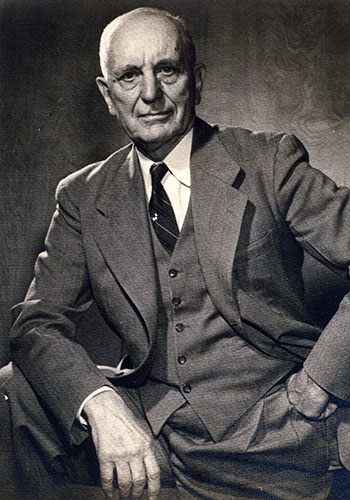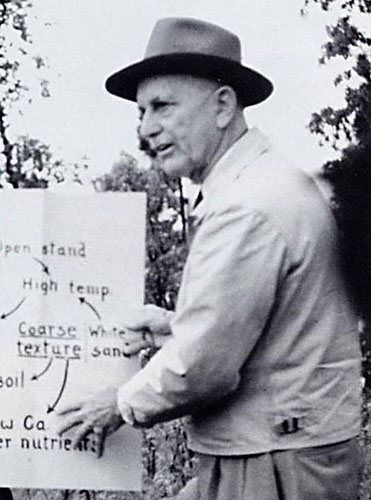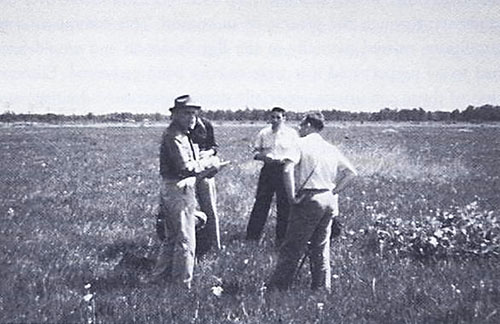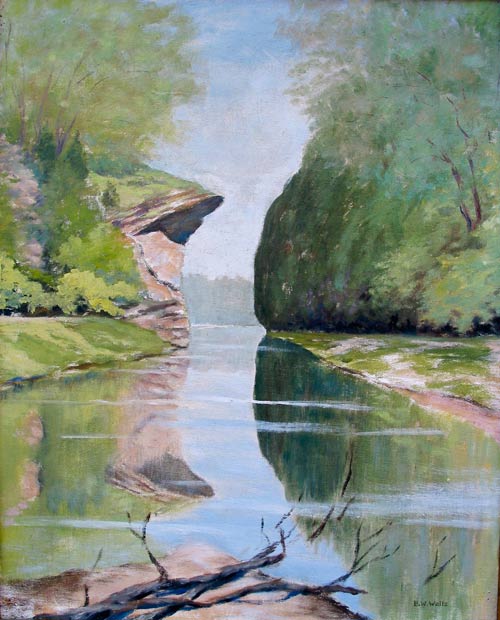About B.W. Wells

B.W. Wells was a pioneer North Carolina ecologist, a passionate conservationist, and the author of many influential scientific papers. Though recognized in his day and ours for his path-breaking work on the ecology of southeastern coastal plain, Wells devoted much of his life to making his scientific knowledge accessible to a wider audience, especially through his great book, The Natural Gardens of North Carolina .
Born in 1884, Wells came to N.C. State University In 1919 to take the position of chairman of the Botany Department, a job he would hold for the next 30 years. In the year after his arrival, on a train trip to Wilmington, the view outside his window changed his life.“ Out of the railroad car window, I saw a vast flat area literally covered with wildflowers,†he recollected years later.“ I immediately made up my mind to see it again.â€
Born in 1884, Wells came to N.C. State University In 1919 to take the position of chairman of the Botany Department, a job he would hold for the next 30 years. In the year after his arrival, on a train trip to Wilmington, the view outside his window changed his life.“ Out of the railroad car window, I saw a vast flat area literally covered with wildflowers,†he recollected years later.“ I immediately made up my mind to see it again.â€
Wells' Travels and Discoveries
It was the Big Savannah, a 1,500-acre treeless wetland near Burgaw that was half a mile wide and nearly two miles long. It was the first of several natural areas throughout the state that he was to call “natural gardens.†He was amazed by the year-long flower show of Big Savannah, but he wondered why these plants grew there and not elsewhere. Why did they grow in such abundance? He was looking not at individual plants but the way they related to each other and to their environment. It’s what we mean by the word “ecology.â€
Soon, Wells was ranging widely across North Carolina, devoting himself to the study of the plant communities he found. “Within two or three years of discovering the marvels of the Big Savannah, says his biographer, James H. Troyer, “he had surveyed all the big plant communities of the state and written a publication that cataloged and described [them].â€
Wells was a great teacher—enthusiastic, dynamic, and quick-witted. And he believed that education was for everyone, not just for university students. As early as the 1920s,Wells was lecturing to garden clubs, schools, and other groups that wanted to hear him. Wells spoke about North Carolina’s natural wonders to audiences in countless school halls and unheated auditoriums, in isolated villages and hamlets throughout the state.
In 1932, Wells summed up his discoveries in his great book, The Natural Gardens of North Carolina.
Retirement
In 1954, at the age of 70, Wells retired from N.C. State and moved with his wife Maude to Rockcliff Farm, the riverbend farm along the Neuse River where he was to spend the final decades of his life Not surprisingly, these were years of great vigor and accomplishment. He inventoried the plant life on their 154 acres, blazed trails through the woods along the river where he loved to walk, and threw himself into his painting hobby.
When B.W. Wells died in 1978, at the age of 94, he was one of the most revered ecologists of his generation. His example stimulated many younger men and women to take up the cause that Wells had championed for so long--the understanding and protection of the wild places that he so colorfully named "natural gardens."
It was the Big Savannah, a 1,500-acre treeless wetland near Burgaw that was half a mile wide and nearly two miles long. It was the first of several natural areas throughout the state that he was to call “natural gardens.†He was amazed by the year-long flower show of Big Savannah, but he wondered why these plants grew there and not elsewhere. Why did they grow in such abundance? He was looking not at individual plants but the way they related to each other and to their environment. It’s what we mean by the word “ecology.â€
Soon, Wells was ranging widely across North Carolina, devoting himself to the study of the plant communities he found. “Within two or three years of discovering the marvels of the Big Savannah, says his biographer, James H. Troyer, “he had surveyed all the big plant communities of the state and written a publication that cataloged and described [them].â€
Wells was a great teacher—enthusiastic, dynamic, and quick-witted. And he believed that education was for everyone, not just for university students. As early as the 1920s,Wells was lecturing to garden clubs, schools, and other groups that wanted to hear him. Wells spoke about North Carolina’s natural wonders to audiences in countless school halls and unheated auditoriums, in isolated villages and hamlets throughout the state.
In 1932, Wells summed up his discoveries in his great book, The Natural Gardens of North Carolina.
Retirement
In 1954, at the age of 70, Wells retired from N.C. State and moved with his wife Maude to Rockcliff Farm, the riverbend farm along the Neuse River where he was to spend the final decades of his life Not surprisingly, these were years of great vigor and accomplishment. He inventoried the plant life on their 154 acres, blazed trails through the woods along the river where he loved to walk, and threw himself into his painting hobby.
When B.W. Wells died in 1978, at the age of 94, he was one of the most revered ecologists of his generation. His example stimulated many younger men and women to take up the cause that Wells had championed for so long--the understanding and protection of the wild places that he so colorfully named "natural gardens."
B.W. Wells Association
Click the links below to learn more about us.




follow us on the social network